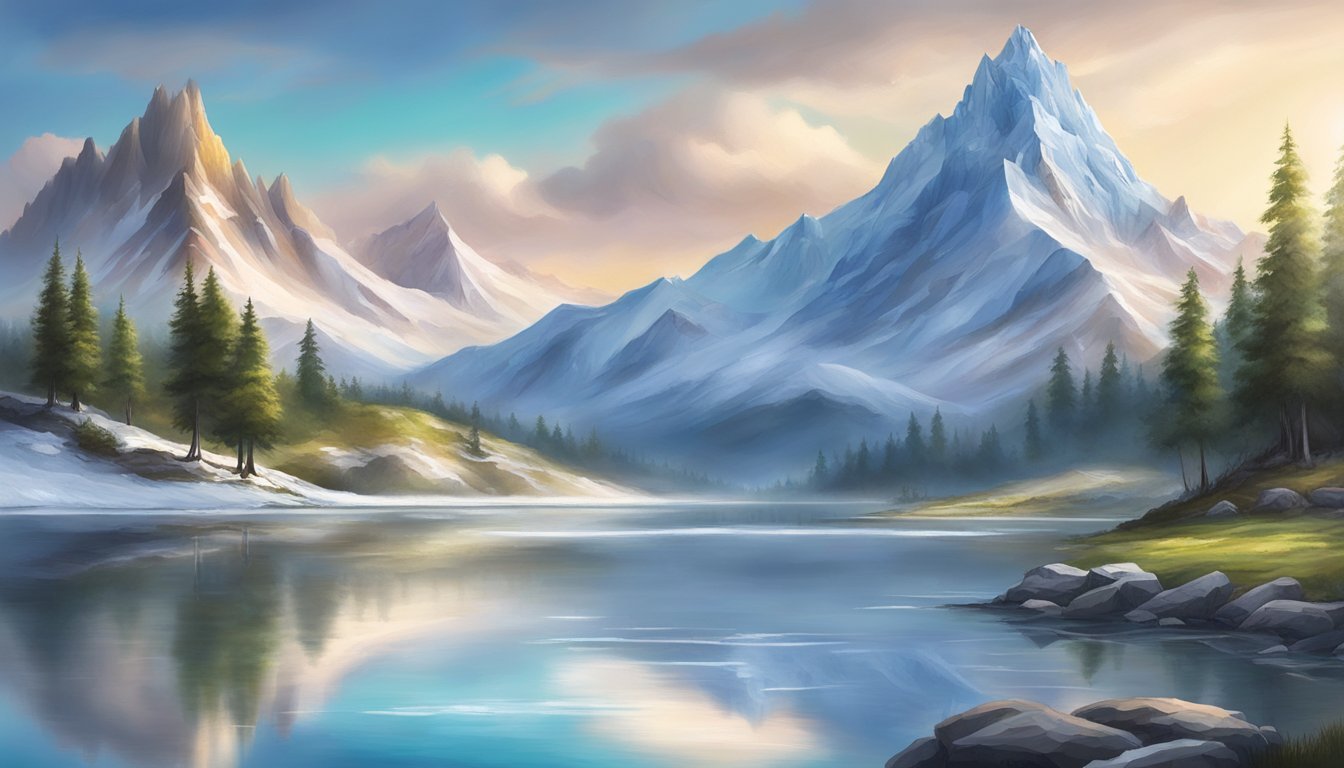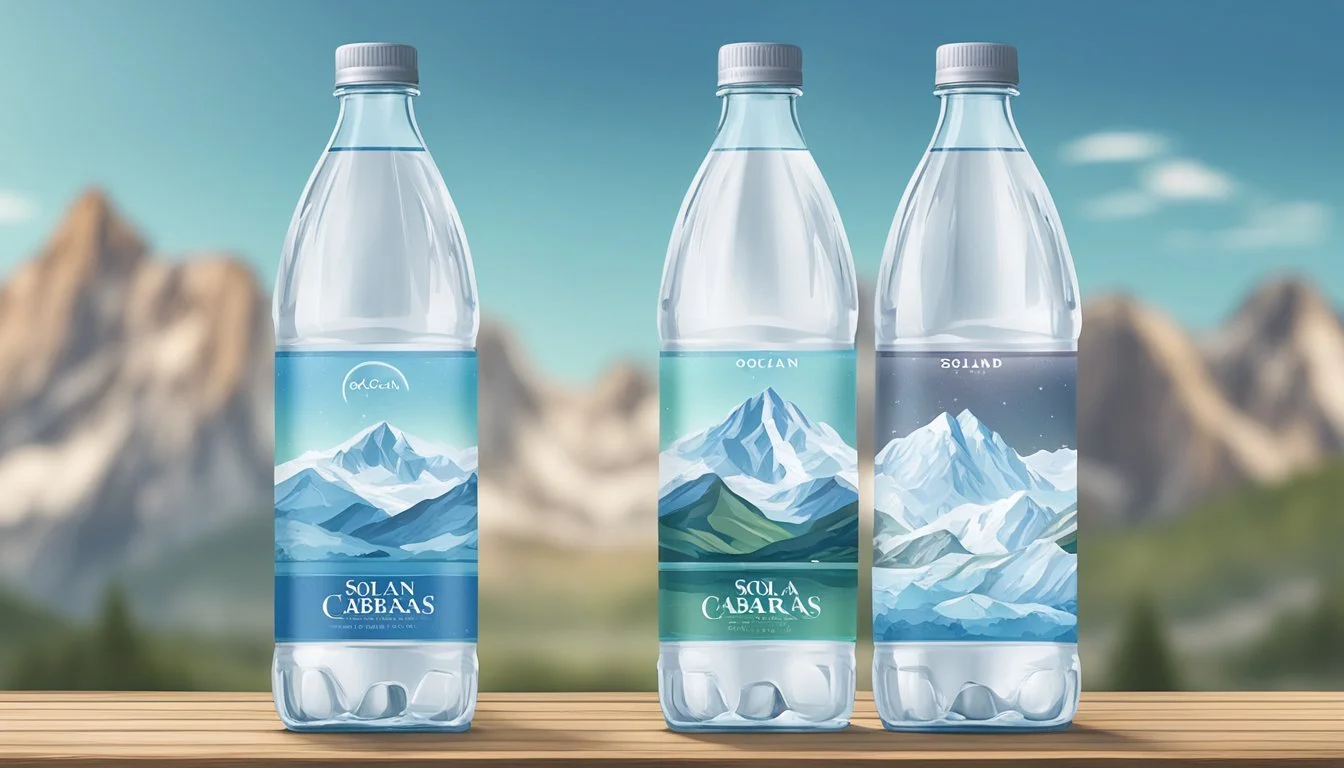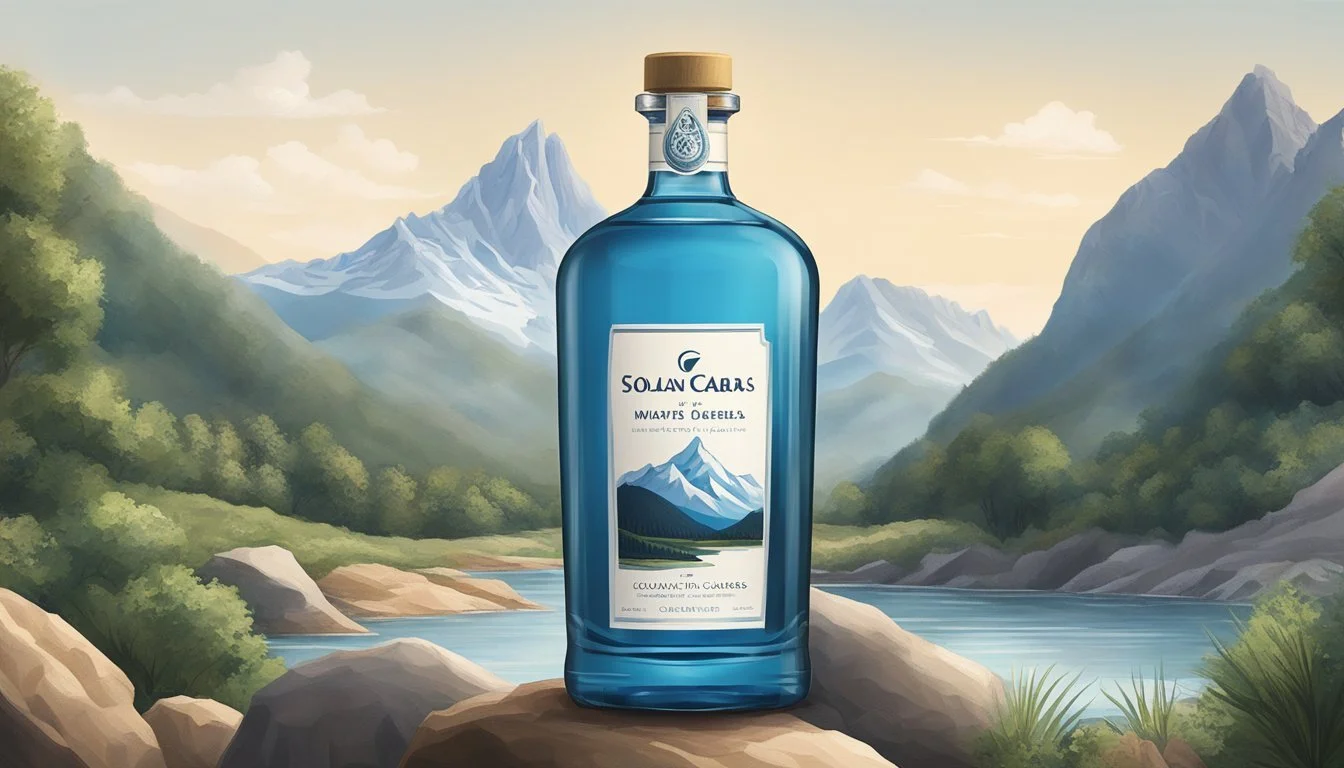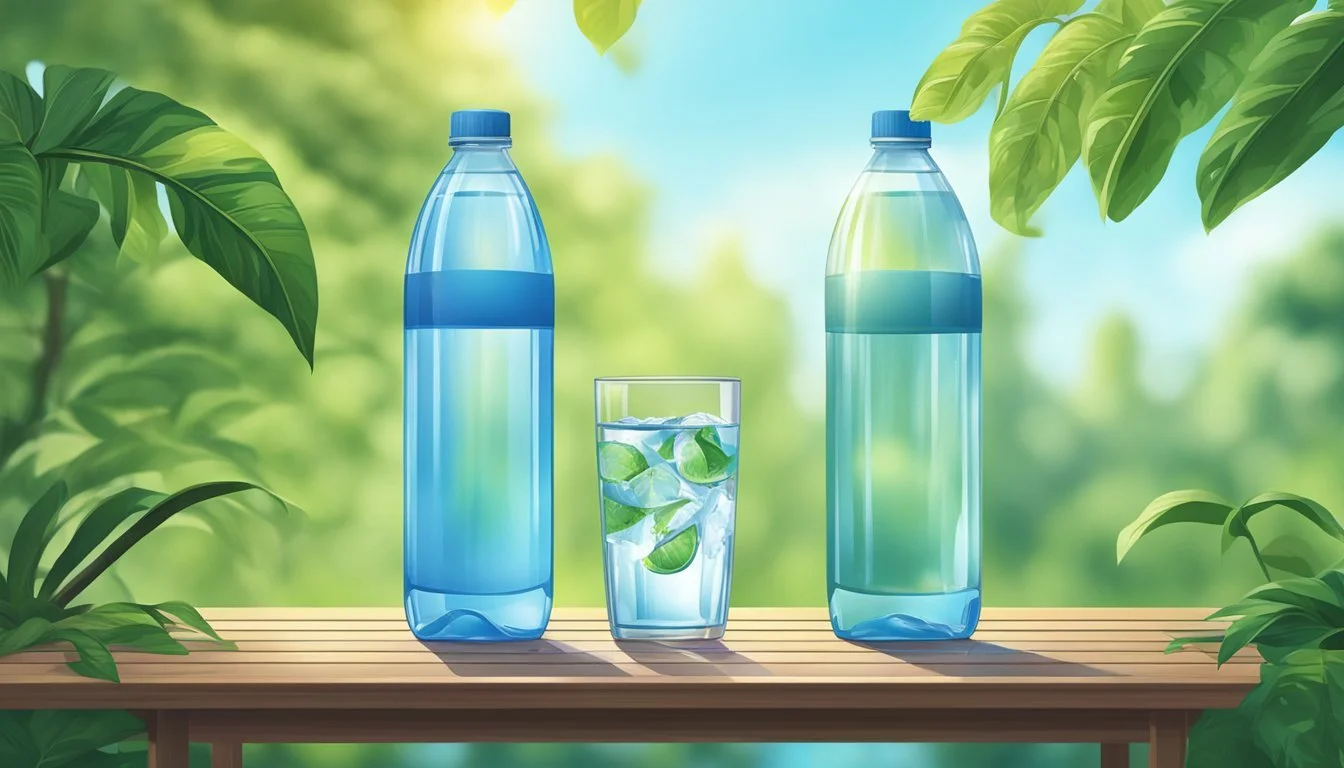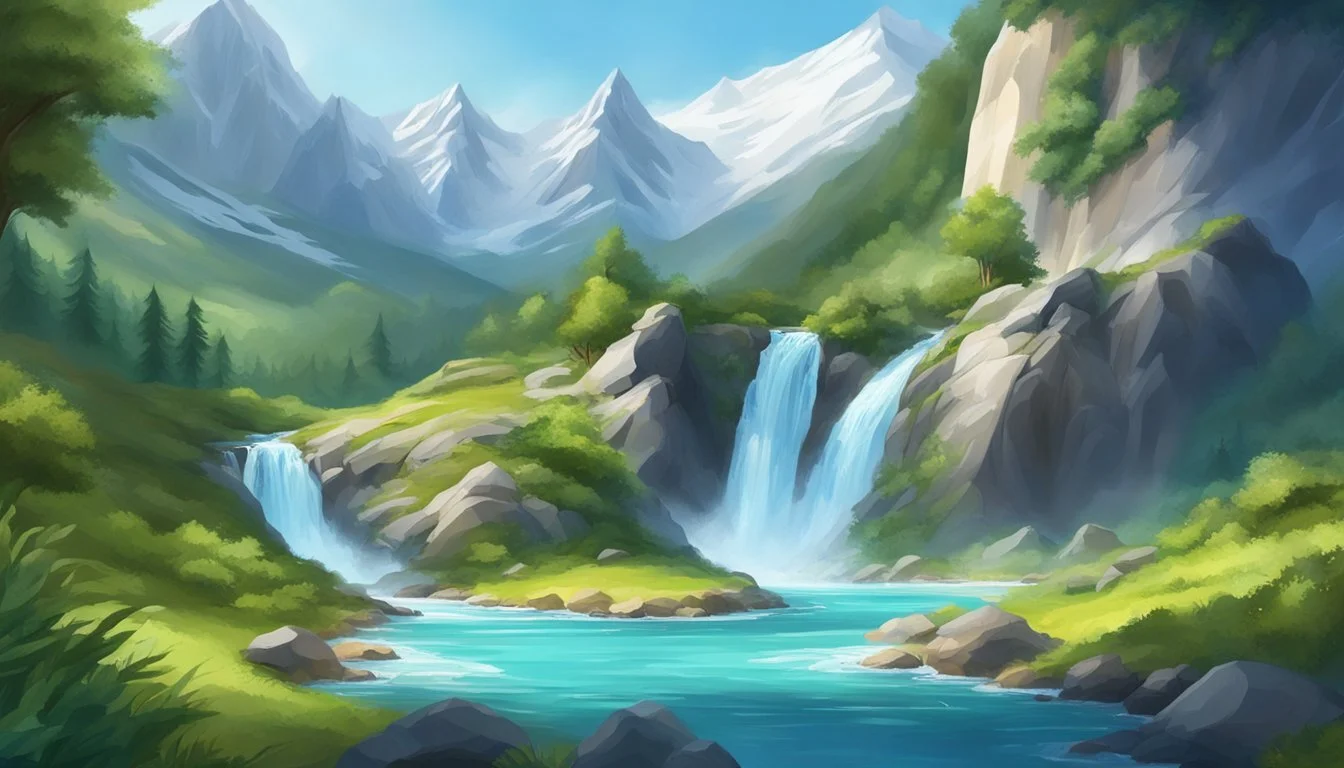Ice Mountain vs. Solán de Cabras
Comparing Purity and Taste
When it comes to high-quality bottled water, Ice Mountain and Solán de Cabras stand out as noteworthy contenders. Ice Mountain, sourced from natural springs in the United States, promises purity and a clean taste that has garnered a loyal following. Solán de Cabras, hailing from Spain, offers a rich flavor profile with hints of minerality that can be refreshing and unique.
For those looking for a bottle that combines sustainability and taste, Ice Mountain's widely recyclable plastic bottles provide a practical choice. On the other hand, Solán de Cabras is known for its distinct blue bottles that are not only aesthetically pleasing but also functional in preserving the water's delicate flavor.
When choosing between Ice Mountain and Solán de Cabras, it ultimately comes down to personal preference in flavor and texture, as well as considerations for environmental impact. Both options present quality choices for bottled water enthusiasts, each with its own set of characteristics that appeal to different tastes and priorities.
Understanding Bottled Water
Bottled water has become a staple in the modern beverage market. Factors such as the source, type, and regulatory standards significantly influence the quality and variety available to consumers.
Evolution of Bottled Water
Bottled water dates back to the 19th century when it was first sold for medicinal purposes. Initially, it was sourced from natural springs believed to have healing properties.
Over time, technological advancements in filtration and packaging gave rise to various brands and types. Today, consumers can choose from different options like spring water, mineral water, and alkaline water. Each type caters to specific preferences for taste and health benefits, underscoring the diversity in the bottled water market.
Types of Bottled Water
Various types of bottled water are available, each meeting distinct consumer needs:
Spring Water: Derived from natural springs and often bottled at the source.
Mineral Water: Contains naturally occurring minerals and is regulated to preserve these characteristics.
Alkaline Water: Has a higher pH level than regular tap water and is marketed for its potential health benefits.
Purified Water: Typically processed through reverse osmosis or distillation to remove impurities.
Brands like Ice Mountain and Solán de Cabras offer products that fit into these categories, each highlighting unique qualities of their water sources and processing methods.
Regulation and Standards
Bottled water is subject to stringent regulations to ensure safety and quality. In the United States, the Food and Drug Administration (FDA) oversees bottled water standards, ensuring it meets safety criteria comparable to tap water.
Additionally, the International Bottled Water Association (IBWA) sets benchmarks for member companies. These standards cover various aspects, including contaminant levels and labeling practices. Regular testing is mandated to maintain compliance and safeguard public health.
Such regulatory frameworks ensure that brands like Ice Mountain and Solán de Cabras meet high-quality benchmarks, offering consumers safe and pure hydration options.
Profile: Ice Mountain
Ice Mountain is a prominent bottled water brand known for its origin in the Midwest United States. The water's quality, derived from its multi-step filtration process, and its balanced taste profile are key aspects to consider.
Origin and Source
Ice Mountain bottled water originates from carefully selected spring sources in the Midwest region of the United States. The brand emphasizes sourcing water from sustainable springs to ensure a consistently pure product. These springs are typically located in natural, protected environments, contributing to the quality of the water. The careful selection of these sources underscores Ice Mountain’s dedication to providing high-quality bottled water.
Quality and Purity
The quality and purity of Ice Mountain water are maintained through a rigorous multi-step filtration process. Initially, large particles are screened out. Then, additional filtration stages, including carbon filtration and UV light treatment, further ensure hygiene and safety. Lab tests frequently measure levels of calcium, magnesium, and sodium to maintain strict quality standards. This comprehensive approach highlights Ice Mountain’s commitment to delivering purer and safer bottled water.
Taste and Minerality
Ice Mountain is valued for its refreshing taste and subtle minerality. Consumers often describe the taste as clean with a slight hint of minerals. The well-balanced presence of minerals such as calcium, magnesium, and sodium adds a mild, non-intrusive flavor that is appreciated by many. These aspects contribute to the overall consumer preference for Ice Mountain as a reliable and enjoyable bottled water choice.
Profile: Solán de Cabras
Solán de Cabras is a premier bottled water brand known for its rich history and dedication to quality. Originating from Spain, this natural mineral water stands out due to its unique source and meticulous production process.
Brand Heritage
Solán de Cabras has a history that spans over 3,600 years, beginning with rainwater filtering through the Serranía de Cuenca mountains. This brand embodies purity and authenticity, tracing its origins back to an ancient landscape in Spain. The company’s commitment to preserving this heritage is evident in its attention to detail and reverence for natural processes.
Production and Quality
The spring water is extracted at 950 meters above sea level from an aquifer in the Serranía de Cuenca mountains. The stringent measures in place ensure that the water remains untouched until bottling. The water undergoes natural filtration through underground rocks, absorbing essential minerals such as bicarbonate, calcium, sodium, potassium, and magnesium. This process takes over 3,600 years, resulting in a balanced and high-quality product.
Flavor Profile
Solán de Cabras water is celebrated for its pure and smooth taste. The long natural filtration process enriches the water with minerals, giving it a subtle yet distinct minerality that appeals to water sommeliers and enthusiasts alike. The balance of these minerals creates a refreshing and clean flavor, making it a popular choice among consumers seeking premium, fine water.
Health and Hydration
Ice Mountain and Solán de Cabras both offer unique benefits for health and hydration, focusing on purity, safety, and mineral content.
Hydration Benefits
Ice Mountain water is sourced from natural springs in the Great Lakes region. It provides clean and fresh hydration, essential for maintaining bodily functions. This bottled water contains a moderate level of minerals and electrolytes, such as calcium and magnesium, that help with fluid balance and muscle function.
Solán de Cabras, sourced from Spain, is known for its naturally balanced mineral composition. It features a slightly alkaline pH, which some claim can aid in neutralizing acidity in the body. The minerals present, including bicarbonate and calcium, can support metabolic processes and enhance hydration.
Both brands aim to offer optimal hydration by making sure the water is not only refreshing but also supportive of overall wellness through its mineral content.
Purity and Safety
Purity and safety are critical when choosing bottled water. Ice Mountain adheres to stringent standards to ensure its water remains free from contaminants. Regular water analysis is conducted to monitor fluoride levels, maintaining a balance that is both safe and beneficial for oral health.
Solán de Cabras undergoes rigorous quality controls to preserve its natural purity. Its water is bottled directly at the source, ensuring minimal human contact, thereby reducing the risk of contamination. The purity of Solán de Cabras water makes it a preferred choice for those seeking uncontaminated hydration.
Both brands prioritize maintaining high standards, offering bottled water that reassures consumers about its quality and safety for health.
Environmental Impact
Both Ice Mountain and Solán de Cabras face significant challenges regarding their environmental impact, from bottle production to water sourcing and recycling issues.
Bottles and Packaging
Ice Mountain typically uses plastic bottles, which are mostly recyclable but often end up in landfills due to improper disposal. Solán de Cabras also uses plastic bottles but places a stronger emphasis on using recycled materials and sustainable packaging options.
Boxed water and bottles made of biodegradable materials are alternatives being explored to reduce the ecological footprint. Both brands could further benefit from investing in sustainable packaging and educating consumers on proper recycling methods.
Water Source Management
Ice Mountain sources its water from springs, primarily in Michigan. This process needs careful management to avoid depleting local water resources or causing ecological harm. Proper water stewardship includes continuous monitoring of water levels and maintaining the natural environment.
Solán de Cabras sources its water from the Serranía de Cuenca in Spain, boasting a long history of purity and natural filtration. They emphasize the sustainability of their water sources, ensuring minimal contamination and responsible extraction practices.
Plastic Waste and Recycling
Plastic waste remains a critical issue for both brands. Ice Mountain has faced criticism for contributing to plastic pollution, although they strive to adhere to FDA and IBWA standards. Recycling efforts are in place but are not entirely sufficient to mitigate the impact.
Solán de Cabras has made strides in reducing plastic waste by using a higher percentage of recycled materials in their bottles. Improving recycling rates and reducing the ecological footprint from plastic production are key goals.
Both brands need to focus on reducing their plastic production and enhancing recycling initiatives to mitigate their environmental impact effectively.
Consumer Considerations
When choosing between Ice Mountain and Solán de Cabras bottled water, consumers should weigh factors such as taste, accessibility, and cost to decide which brand best meets their needs and preferences. Each brand offers unique attributes that could influence a buyer's decision.
Taste and Personal Preference
Taste is a primary factor for many consumers. Ice Mountain is known for its crisp and neutral taste, sourced from natural springs in the Midwest. It offers a familiar profile that appeals to a broad audience. In contrast, Solán de Cabras presents a more distinctive flavor, with a slight mineral tang deriving from its Spanish spring source.
This taste can be particularly appealing to those with refined palates, such as water sommeliers or those accustomed to higher minerality. Ultimately, the choice between these brands often boils down to personal preference and the specific taste profile that the consumer is seeking.
Accessibility and Convenience
Ice Mountain is widely available in convenience stores across the United States, making it an easy and practical choice for many. Its partnership with Nestlé contributes to its extensive distribution network. Consumers can find Ice Mountain in various package sizes, enhancing its convenience for different occasions, from individual servings to large gatherings.
Solán de Cabras, while popular in Europe, especially Spain, might be less accessible in some regions. However, it has a distinct and recognizable design, often available in gourmet stores or high-end supermarkets. The accessibility of each brand will largely depend on the consumer's location and the availability of distribution channels in their area.
Cost and Affordability
Affordability is another significant consideration. Ice Mountain is generally priced competitively, making it a budget-friendly option for everyday hydration. Its production and distribution by a major corporation allow it to keep prices relatively low, appealing to a broader consumer base.
On the other hand, Solán de Cabras is often positioned as a premium brand, reflected in its higher price point. This brand might be considered an "expensive water" due to its unique source and elegant packaging. Consumers seeking a luxurious experience or a water with distinct character might find the higher cost justified, whereas those prioritizing affordability might lean toward Ice Mountain.
In summary, both Ice Mountain and Solán de Cabras offer distinct advantages, and consumer choice will depend on individual priorities, including taste, convenience, and cost.
Comparative Analysis
To determine which bottled water brand offers superior quality, taste, and reputation, we will examine Ice Mountain and Solán de Cabras in various key areas.
Direct Comparison
Taste Profile:
Ice Mountain water is often described as clean and crisp with a neutral taste. Solán de Cabras water offers a light, slightly sweet flavor, attributed to its natural mineral content from the Serranía de Cuenca.
Purity and Composition:
Ice Mountain utilizes a multi-step filtration process removing large particles and impurities. Solán de Cabras boasts a natural filtration system through ancient geological formations, ensuring its purity. Both brands undergo stringent quality checks, supported by transparent water analysis reports.
Total Dissolved Solids (TDS):
Ice Mountain maintains an average TDS of 50 mg/L, indicating low mineral content. Solán de Cabras, with a TDS around 250 mg/L, offers a richer mineral profile, providing a distinct taste and health benefits.
Market Position and Brand Image
Ice Mountain:
Positioned prominently in the North American market, Ice Mountain is known for affordability and availability. It is a household name backed by Nestlé, ensuring wide distribution through major retailers and online platforms.
Solán de Cabras:
A premium brand from Spain, Solán de Cabras emphasizes purity and heritage. It is often marketed at upscale venues such as fine dining restaurants and is even served at Starbucks in select regions. The elegant blue glass bottles enhance its luxurious image.
Brand Identity:
Ice Mountain is associated with reliability and family-oriented marketing. Solán de Cabras conveys a message of sophistication and natural origins, appealing to health-conscious consumers and water connoisseurs.
Expert Opinions and Tests
Consumer Reports:
Ice Mountain generally receives positive reviews for its consistent quality and value for money. Solán de Cabras is praised for its distinctive taste and mineral-rich composition, often highlighted by water sommeliers.
Water Sommelier Evaluations:
Experts note Ice Mountain's ideal balance for daily consumption due to its clean and neutral taste. Solán de Cabras is frequently recognized for its unique flavor profile and velvety texture, making it a favorite in water tasting events.
Quality Reports:
Both brands provide detailed quality reports available in PDF format. These documents showcase rigorous testing and compliance with international standards. Solán de Cabras' natural filtration process and historical background add an extra layer of credibility and prestige.
By assessing these factors, consumers can make a more informed choice based on their preferences for taste, mineral content, and brand values.
Conclusions and Recommendations
Ice Mountain and Solán de Cabras present distinct choices for bottled water enthusiasts.
Water Quality:
Ice Mountain undergoes a multi-step filtration process to ensure purity. It meets FDA and IBWA standards. Solán de Cabras stands out for its natural spring source and minimal processing, providing a clean and authentic taste. Both brands deliver high-quality water, but the natural purity of Solán de Cabras could appeal more to purists.
Sustainability:
Ice Mountain has faced scrutiny over its environmental impact, particularly regarding plastic waste. They have initiated recycling programs to mitigate this issue. In contrast, Solán de Cabras markets itself as an eco-friendly choice, using recyclable materials and emphasizing sustainable practices. Their commitment to the environment may influence environmentally-conscious consumers.
Consumer Choice:
When it comes to price, Ice Mountain often offers a more budget-friendly option. Solán de Cabras typically occupies the premium segment, targeting consumers willing to pay more for perceived superior quality and sustainability.
Summary Table
Aspect Ice Mountain Solán de Cabras Water Quality Multi-step filtration Natural spring source Sustainability Some recycling efforts Strong eco practices Price Budget-friendly Premium pricing
Both Ice Mountain and Solán de Cabras cater to different needs. Ice Mountain is suitable for those seeking reliable, affordable bottled water. Solán de Cabras fits those preferring a more natural, eco-conscious option.
More About Ice Mountain
Core Hydration vs Ice Mountain: Which Bottled Water is Better?
Ice Mountain vs Aqua Carpatica: Which Bottled Water is Better?
Ice Mountain vs Cascade Mountain: Which Bottled Water is Better?
Ice Mountain vs Crystal Geyser: Which Bottled Water is Better?
Ice Mountain vs Crystal Lake: Which Bottled Water is Better?
Ice Mountain vs Essence pH10: Which Bottled Water is Better?
Ice Mountain vs Hawaii Volcanic: Which Bottled Water is Better?
Ice Mountain vs Hawaiian Springs: Which Bottled Water is Better?
Ice Mountain vs Icelandic Glacial: Which Bottled Water is Better?
Ice Mountain vs Kirkland Signature: Which Bottled Water is Better?
Ice Mountain vs Liquid Death: Which Bottled Water is Better?
Ice Mountain vs Mountain Valley Spring Water: Which Bottled Water is Better?
Ice Mountain vs Nestle Pure Life: Which Bottled Water is Better?
Ice Mountain vs Poland Spring: Which Bottled Water is Better?
Ice Mountain vs Proud Source: Which Bottled Water is Better?
Ice Mountain vs Purely Sedona: Which Bottled Water is Better?
Ice Mountain vs Richard's Rainwater: Which Bottled Water is Better?
Ice Mountain vs San Pellegrino: Which Bottled Water is Better?
Ice Mountain vs Simple Truth: Which Bottled Water is Better?
Ice Mountain vs Talking Rain AQA: Which Bottled Water is Better?
Ice Mountain vs Whole Foods 365: Which Bottled Water is Better?
Ice Mountain vs Whole Foods Italian Still Mineral water: Which Bottled Water is Better?
More About Solán de Cabras
Acqua Pana vs Solan de Cabras: Which Bottled Water is Better?
Antipodes vs Solan de Cabras: Which Bottled Water is Better?
Aqua Carpatica vs Solan de Cabras: Which Bottled Water is Better?
Arrowhead vs Solan de Cabras: Which Bottled Water is Better?
Boxed Water vs Solan de Cabras: Which Bottled Water is Better?
Castle Rock vs Solan de Cabras: Which Bottled Water is Better?
Core Hydration vs Solan de Cabras: Which Bottled Water is Better?
Deer Park vs Solan de Cabras: Which Bottled Water is Better?
Hawaiian Springs vs Solan de Cabras: Which Bottled Water is Better?
Icelandic Glacial vs Solan de Cabras: Which Bottled Water is Better?
Just Water vs Solan de Cabras: Which Bottled Water is Better?
Mountain Valley Spring Water vs Solan de Cabras: Which Bottled Water is Better?
Nestle Pure Life vs Solan de Cabras: Which Bottled Water is Better?
Poland Spring vs Solan de Cabras: Which Bottled Water is Better?
San Pellegrino vs Solan de Cabras: Which Bottled Water is Better?
Smartwater vs Solan de Cabras: Which Bottled Water is Better?
Solan de Cabras vs 1907water: Which Bottled Water is Better?
Solan de Cabras vs Alkaline88: Which Bottled Water is Better?
Solan de Cabras vs Big Chill: Which Bottled Water is Better?
Solan de Cabras vs BodyArmor: Which Bottled Water is Better?
Solan de Cabras vs Cascade Mountain: Which Bottled Water is Better?
Solan de Cabras vs CBD Living: Which Bottled Water is Better?
Solan de Cabras vs Crystal Geyser: Which Bottled Water is Better?
Solan de Cabras vs Crystal Lake: Which Bottled Water is Better?
Solan de Cabras vs Essence pH10: Which Bottled Water is Better?
Solan de Cabras vs Hawaii Volcanic: Which Bottled Water is Better?
Solan de Cabras vs Kirkland Signature: Which Bottled Water is Better?
Solan de Cabras vs Liquid Death: Which Bottled Water is Better?
Solan de Cabras vs Open Water: Which Bottled Water is Better?
Solan de Cabras vs Proud Source: Which Bottled Water is Better?
Solan de Cabras vs Pure Life: Which Bottled Water is Better?
Solan de Cabras vs Purely Sedona: Which Bottled Water is Better?
Solan de Cabras vs Richard's Rainwater: Which Bottled Water is Better?
Solan de Cabras vs Simple Truth: Which Bottled Water is Better?
Solan de Cabras vs Talking Rain AQA: Which Bottled Water is Better?
Solan de Cabras vs Weird Water: Which Bottled Water is Better?
Solan de Cabras vs Whole Foods 365: Which Bottled Water is Better?
Solan de Cabras vs Whole Foods Italian Still Mineral water: Which Bottled Water is Better?
Topo Chico vs Solan de Cabras: Which Bottled Water is Better?
Zephyrhills vs Solan de Cabras: Which Bottled Water is Better?

